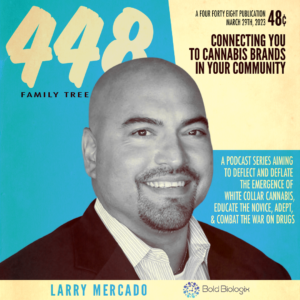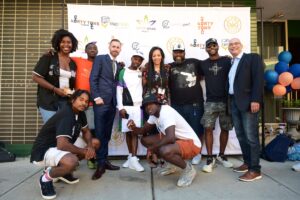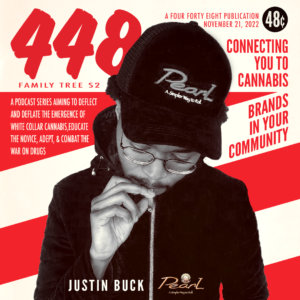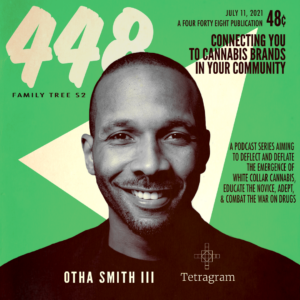8 Minority-Owned Dispensaries Making a Difference
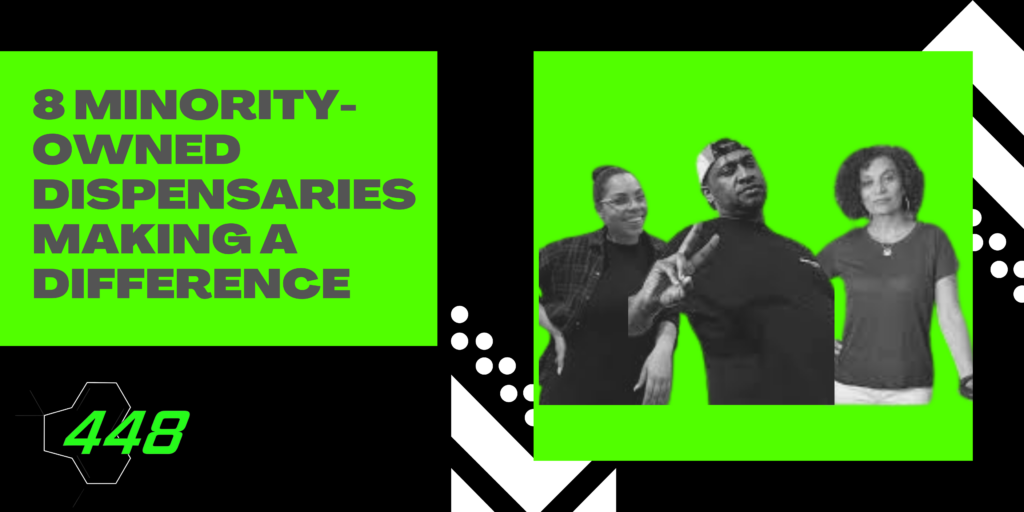

During the beginning of the pandemic cannabis retail shops, better known as dispensaries, were deemed as essential businesses. Whether the dispensary was medical or recreational, this was surprisingly good news across the nation. Cannabis and the stores that had it available became a high commodity in 2020. According to a BDSA report, global cannabis sales reached nearly $21.3 billion in 2020, an increase of 48% over 2019 sales of $14.4 billion.
Not only was cannabis considered an essential business but because of an increase in consumers and sales, it also created a higher demand and desire for cannabis retail shops in all communities. Especially in minority communities affected by cannabis negatively due to the war on drugs initiative. In many adult-use legal states, advocates and state government officials have made sure there are laws in place that require the state to allow/accept a minimum number of social equity license applicants.
To become a dispensary owner it takes lots of time, paperwork, and money. Many social equity and cannabis dispensary license applicants have been working on their application, attaining a license, securing funding, securing a compliant storefront, and more for years before the pandemic in order to be operational today. In the last two years more minority, woman, and queer-owned dispensaries have opened around the country. The industry may possibly not have seen this much diversity in cannabis retail ownership if not for the pandemic.
In the past few months, Southern California has had three black woman-owned dispensaries open for business. Many of these retailers carry black, brown, and queer-created cannabis brands as well. We’re highlighting eight minority-owned dispensaries making a difference in their communities as well as in the cannabis industry altogether.
Sixty Four and Hope (Los Angeles, CA) – https://www.64andhope.com/
Image Credit: https://mjbrandinsights.com/
Aja Allen grew up in Crenshaw and saw in her own neighborhood how damaging the war on drugs can be. “The system is not designed for us. It just is what it is” Allen told NBC Los Angeles. Though she didn’t have a background in the industry her own personal experiences inspired her to apply for a social equity grant. In 2018 Allen started a three-year-long process of applying for a license and navigating the process of applying and acquiring a cannabis retail space. Sixty Four & Hope officially opened its doors in September of 2021 and she’s now the owner of a 4,200 square foot retail space in Central Los Angeles. . Allen is one of 21 social equity applications, sponsored by the Black-owned investment startup 4thMVMT.
Blunts + Moore (Oakland, CA) – https://www.bluntsandmoore.com/
Image Credit: https://theemeraldmagazine.com/
Blunts + Moore founder and owner, Alphonso, better known as, “Tucky” Blunt Jr qualified as an Oakland Social Equity applicant due to his past with cannabis and the legal system. “Blunt was arrested in the very city he was raised in for possession of cannabis. He had less than $80 worth of flower on him at the time. In 2004 Blunt was arrested, and sentenced to 10 years of felony probation with a search clause, meaning that he and his possessions could be searched at any moment when law enforcement was present,” according to Emerald Magazine. Blunts + Moore became the first social equity dispensary opened in 2018, located in Oakland, California. Today they are one of the top-rated dispensaries in the city.
Legal Greens (Brockton, MA) – https://legalgreens.net/
Image Credit: https://www.dispensarygenie.com/
Legal Greens is the first black woman-owned dispensary in the state of Massachusetts. “As first-generation Haitian Americans, we are fulfilling our parents’ dreams of creating a better life for future generations to come,” owner Vanessa Jean-Baptiste told Enterprise News. Jean-Baptiste along with co-owner Mark Bouquet are the first Haitian-Americans to open a dispensary in the United States. They started the social equity application process of 2017, in 2018 they reached issues negotiating with the city of Brockton, and some obstacles, and years later Legal Greens officially opened in March 2021. Many employees are black women, an intentional choice made by the owners.
Gorilla Rx Wellness (Los Angeles, CA) – https://www.gorillarxwellness.com/
Image Credit: ladowntownnews.com
Kika “Big Kika” Keith recently became the first black woman to own and open a dispensary in Los Angeles. Gorilla Rx Wellness opened its doors in September 2021. The shop is under the city’s social equity program, and although the program was open to 100+ applicants it was based on a first come first served basis making the process even more competitive. After a lot of time and patience, Keith was able to secure a retail license. “This was a historic moment,” she said. “There was no other time, from the time of slavery, that we were able to be a part of an industry. I would be damned if I would be a part of sitting back and watching it happen,” she told LA Downtown News. Gorilla Rx Wellness has a fully black staff and carries several minority-owned cannabis products including their own original ‘Black Women Get Us Higher” merchandise.
Mary & Main (Capitol Heights, MD) – https://maryandmain.com/
Image Credit: https://www.thebluntness.com/
Mary and Main owner, Hope Wiseman, made history becoming the youngest black dispensary owner in the United States at just 26 years old. Mary and Main opened in 2017 in Prince George County, Maryland founded by Wiseman, and her mother Dr. Octavia Simkins-Wiseman. Medical adult use of cannabis was legalized in Maryland in 2014. The same year Wiseman began the process of building her own dispensary, which included fundraising and obtaining a license. Since its opening, the cannabis retail shop has been successfully operating and has also hosted expungement clinics for the community members and workshops to learn how to get involved in the cannabis industry. Wiseman has also hosted virtual events and been a panel speaker at several cannabis events to talk about her experience as a woman of color in cannabis and educate others on the process of opening a dispensary.
Josephine & Billies (Los Angeles,CA) – https://josephineandbillies.com/
Image Credit: https://www.thrillist.com/
Josephine and Billies became the second black woman-owned dispensary to open in Los Angeles last year. Aptly named after Josephine Baker and Billie Holiday, this dispensary was inspired by the 1920’s Harlem Renaissance, and the store is designed to look and feel like a luxury speakeasy. Founded by CEO Whitney Beatty and COO Ebony Andersen, both women of color who have been involved in the cannabis industry years prior. After receiving funding through Jay-Z’s cannabis investment firm, The Parent Company’s social equity program. The program was created to fund and assist minority marijuana business owners/entrepreneurs with the financial backing they need to succeed in the industry. Since the opening of Josephine and Billies, in June 2021, the store has been successful and has been featured in Essence Magazine, The Los Angeles Times, The Grio, and on NBC News for their history-making debut in the California cannabis industry.
Simply Pure (Denver, CO) – https://simplypure.com/
Wanda James and her husband Scott Durrah made history in 2010 by becoming the first black-owned dispensary license holders ever in the United States. Though Colorado didn’t officially fully legalize adult-use cannabis until 2012, James and Durrah had to go through a long and competitive process with several others interested in getting first dibs on the first legal cannabis licenses. By 2016 James was featured in the “50 most important women in the cannabis industry” by CBE (Cannabis Business Expo) and in 2018 on “High Times 100 Most Influential People in Cannabis”. Present-day Simply Pure remains and continues to operate with over 30 employees and earning a revenue upwards of $2.5M a year.
Posh Green Collective (San Francisco, CA) – www.poshgreencollective.com/
Image Credit: SFWeekly.com
Reese Benton became the first black woman to open a cannabis dispensary in San Francisco as part of a cannabis social equity program. Benton was actually a part of helping the city develop a social equity program as the first black-owned dispensary in the area. Posh Green Collective opened and started its process of becoming a cannabis retail storefront in 2016 through 2017. However due to various legal obstacles including a community petition that led to an injunction of the building she chose for her shop, a previous retail space. Her struggle with becoming a black woman-owned dispensary shed light on how inequitable the city’s social equity program really was. She began working with government officials and this led to actual policy change in the program. Three years later, in June 2020, Benton was officially able to operate and open Posh Green in her community.

